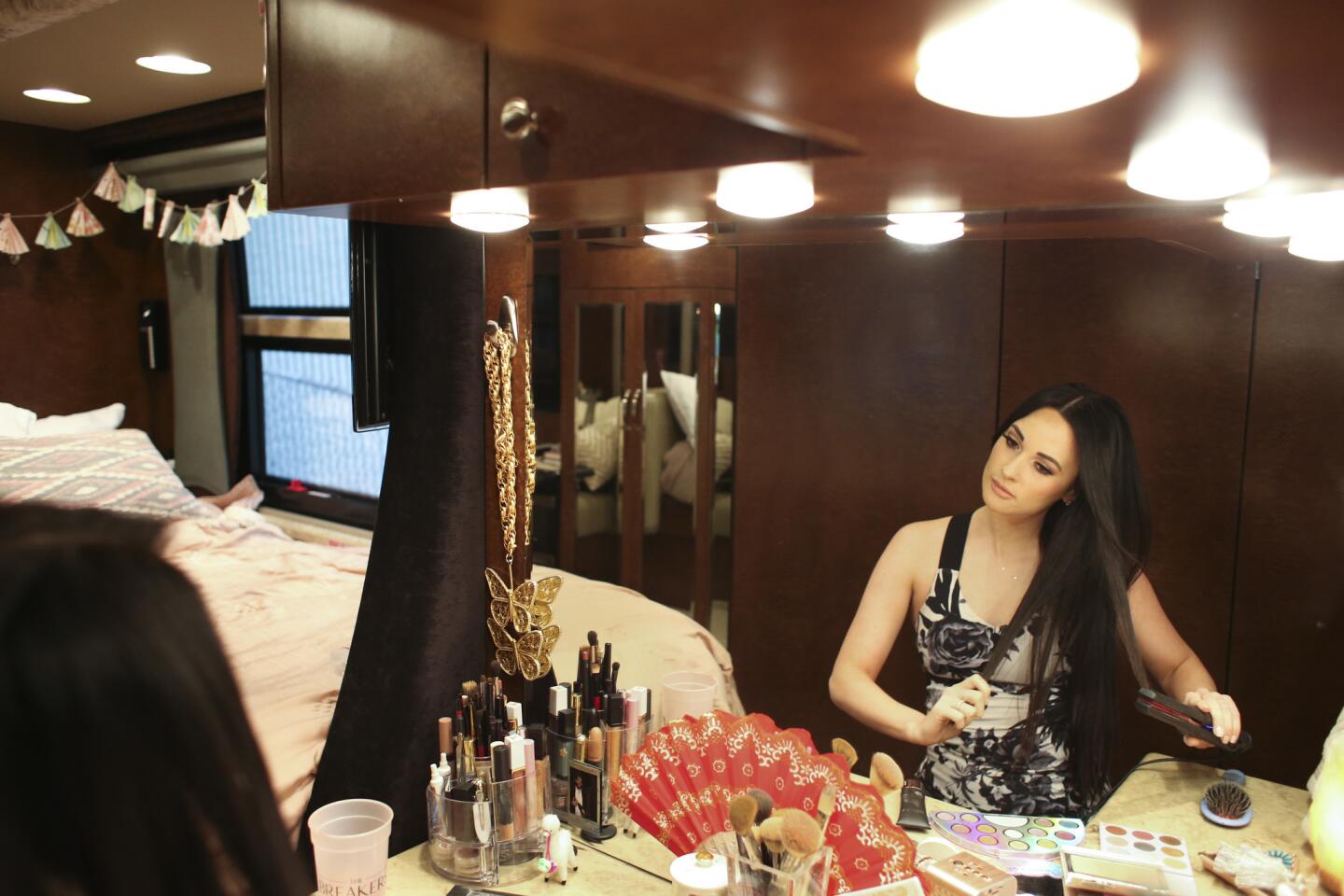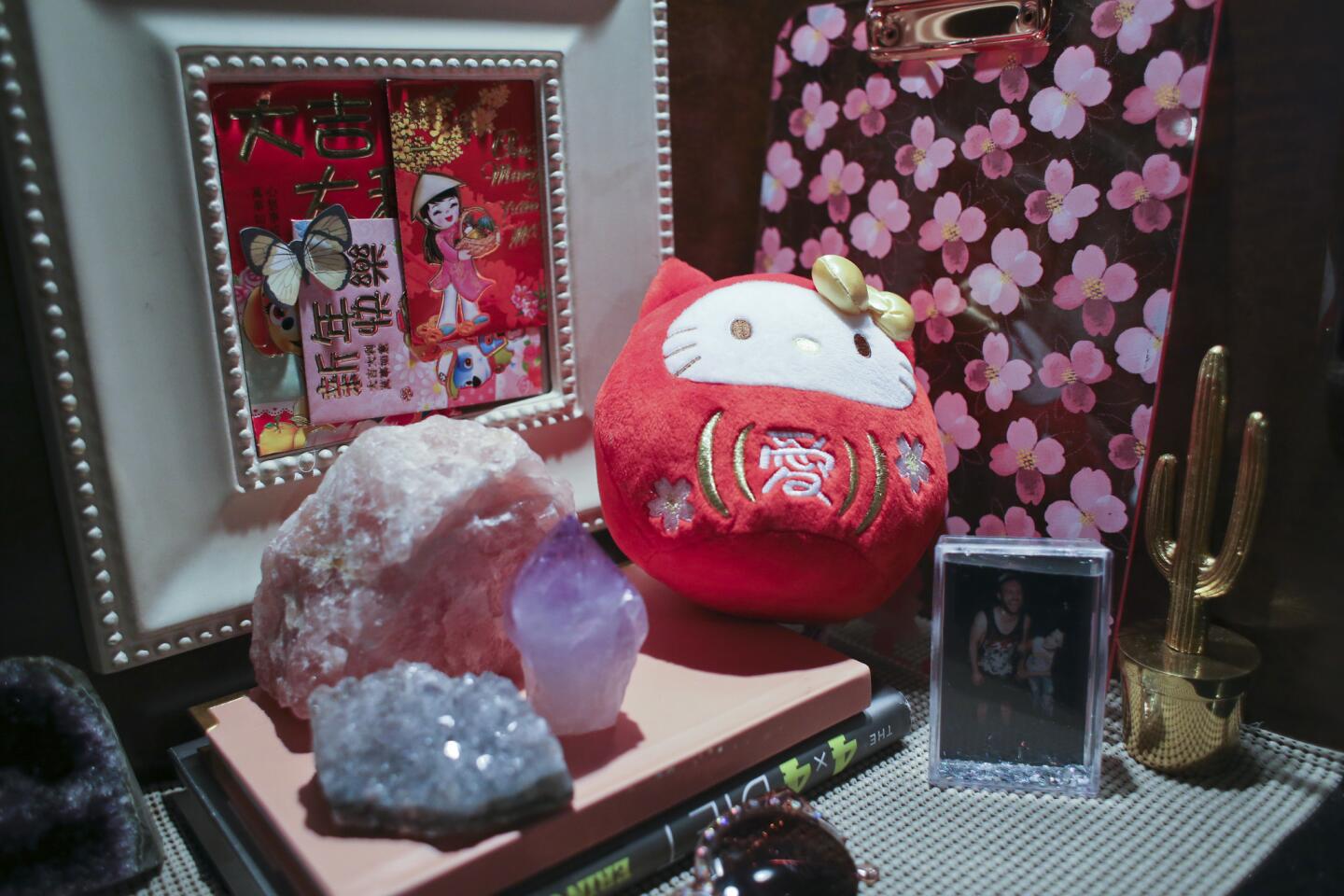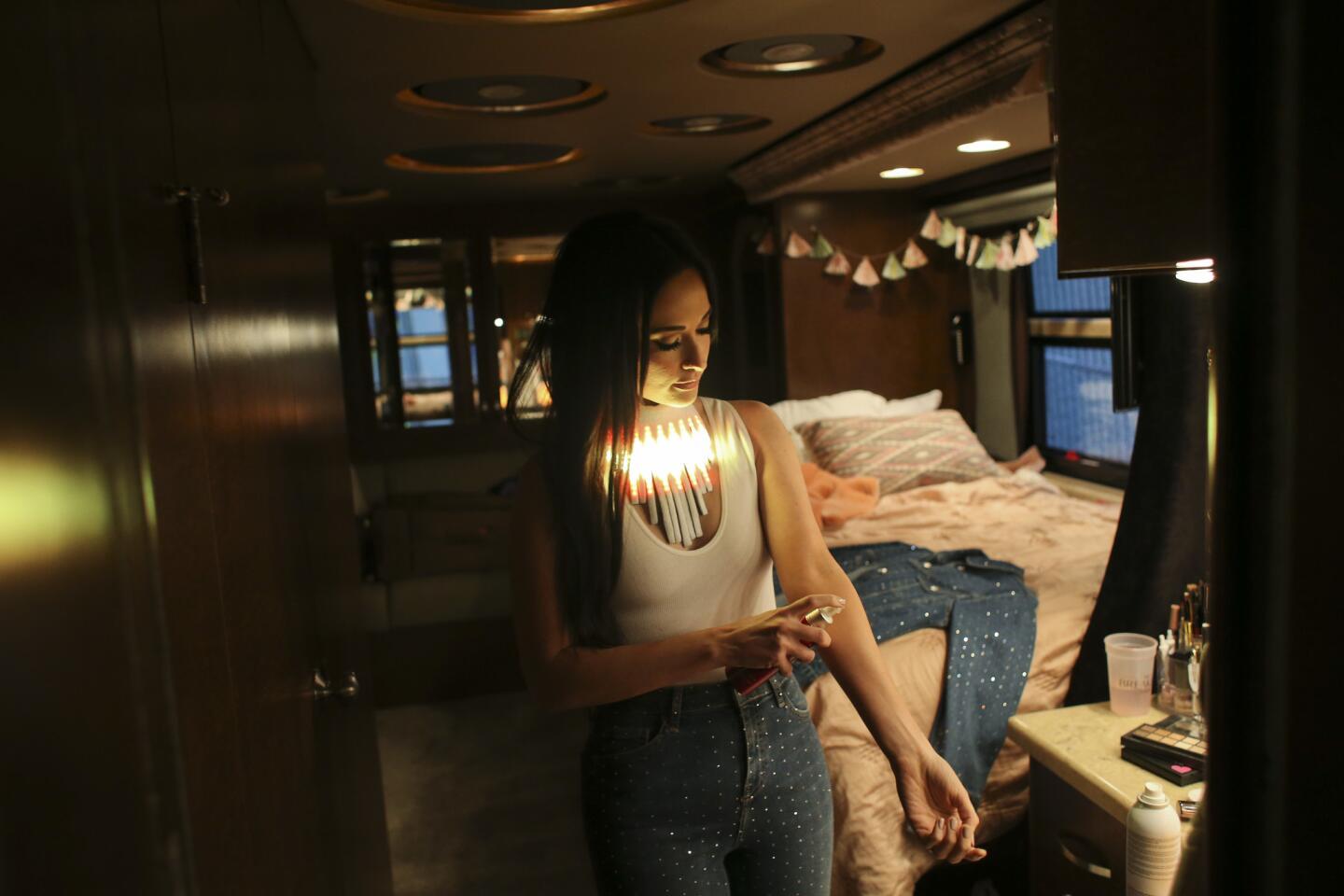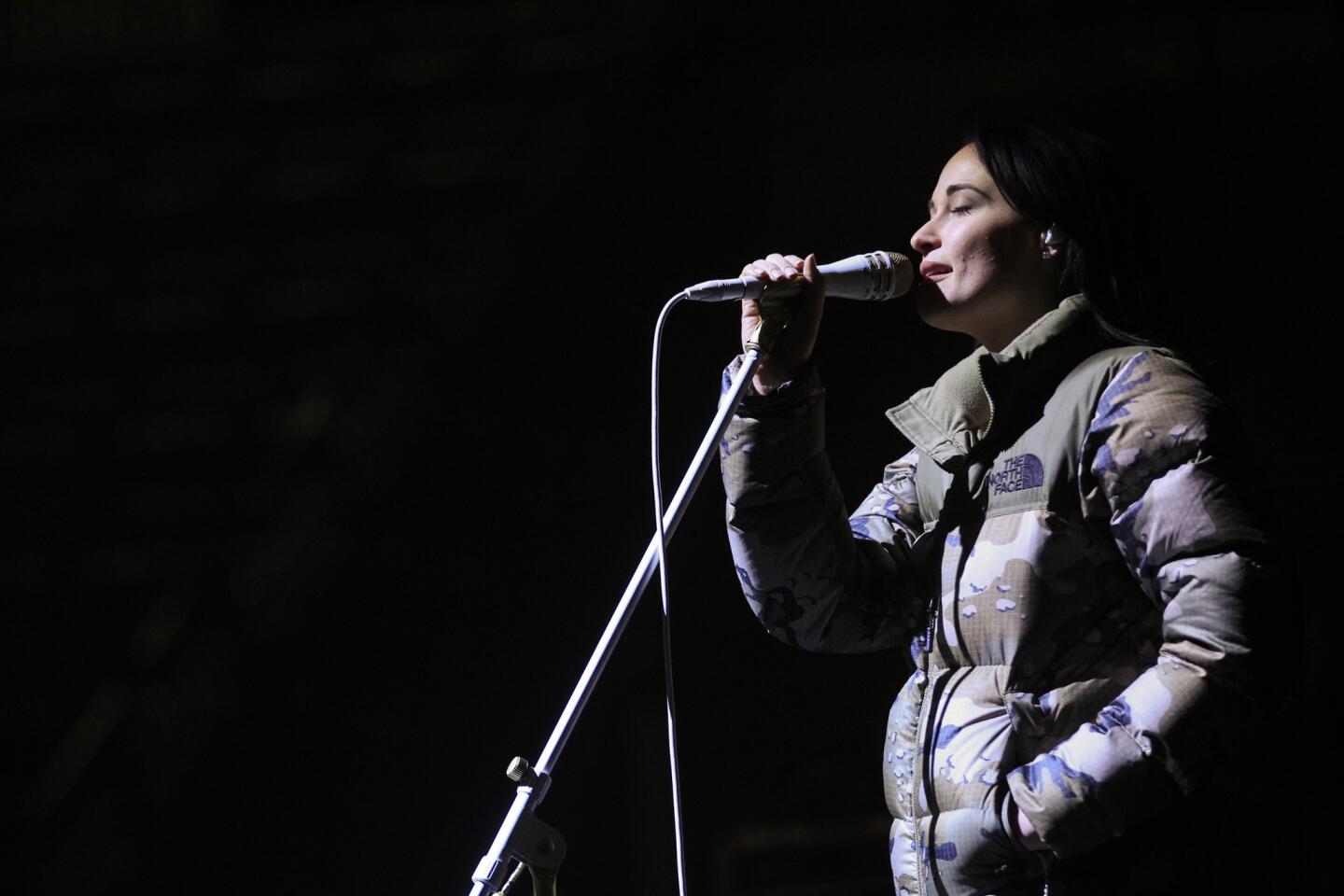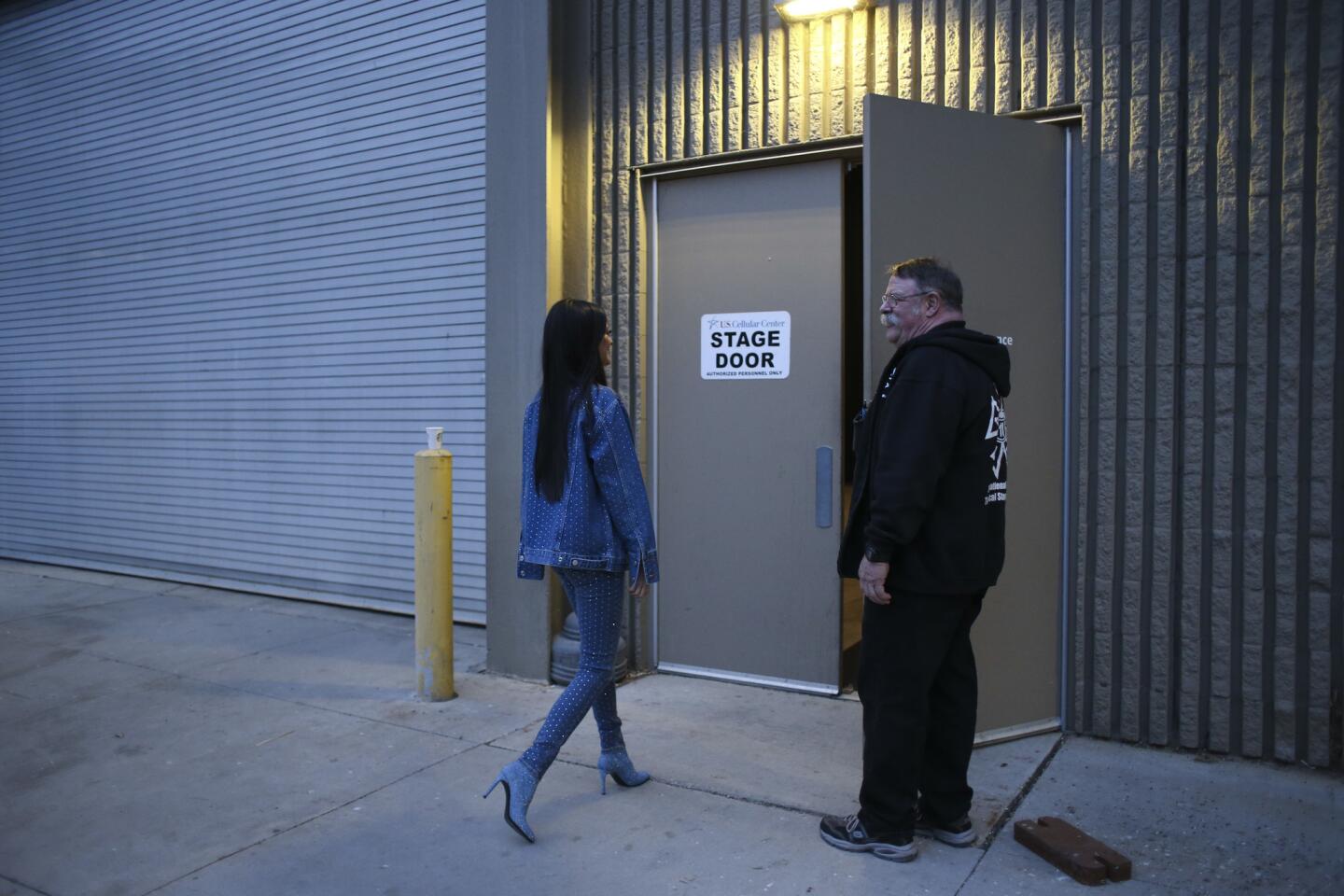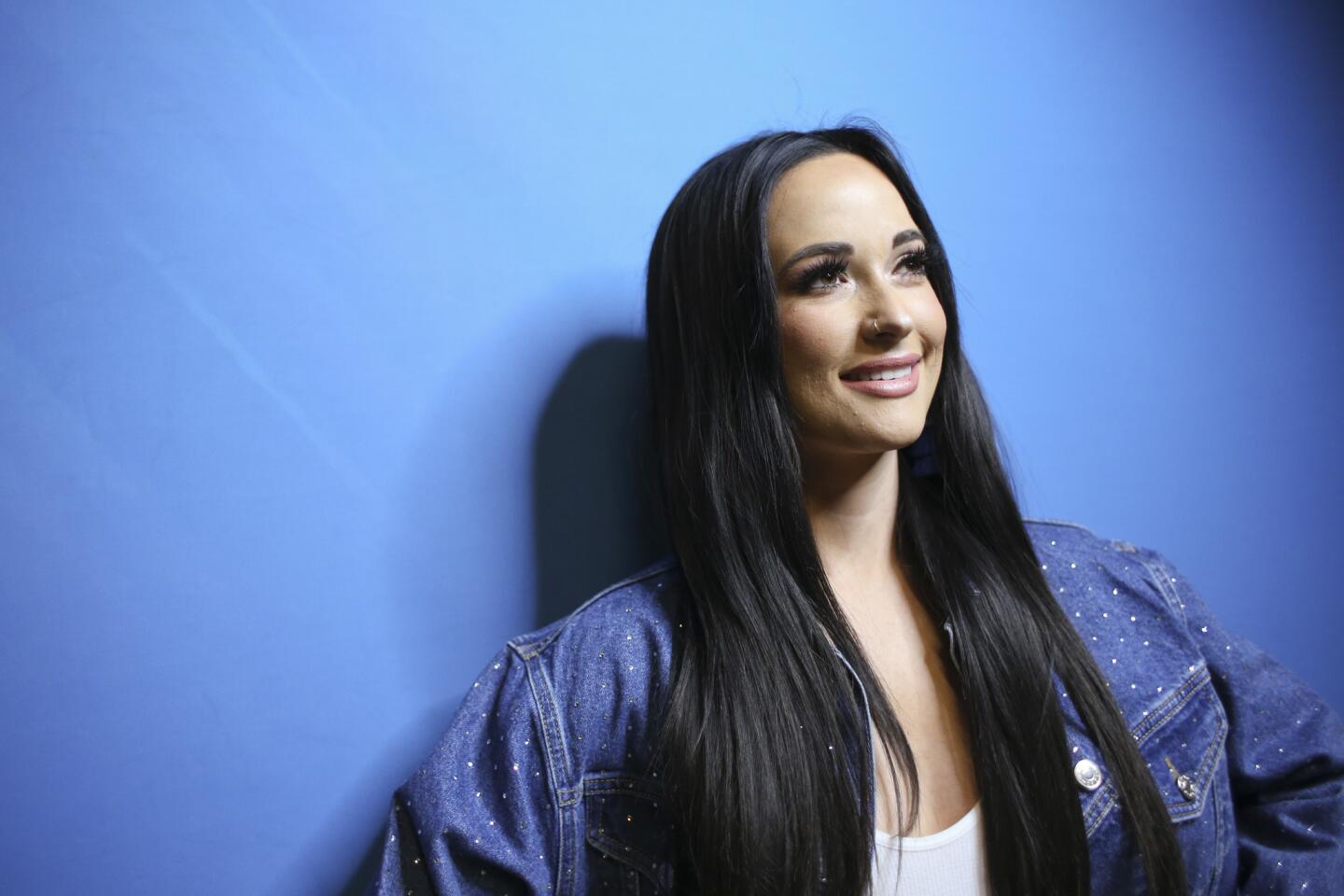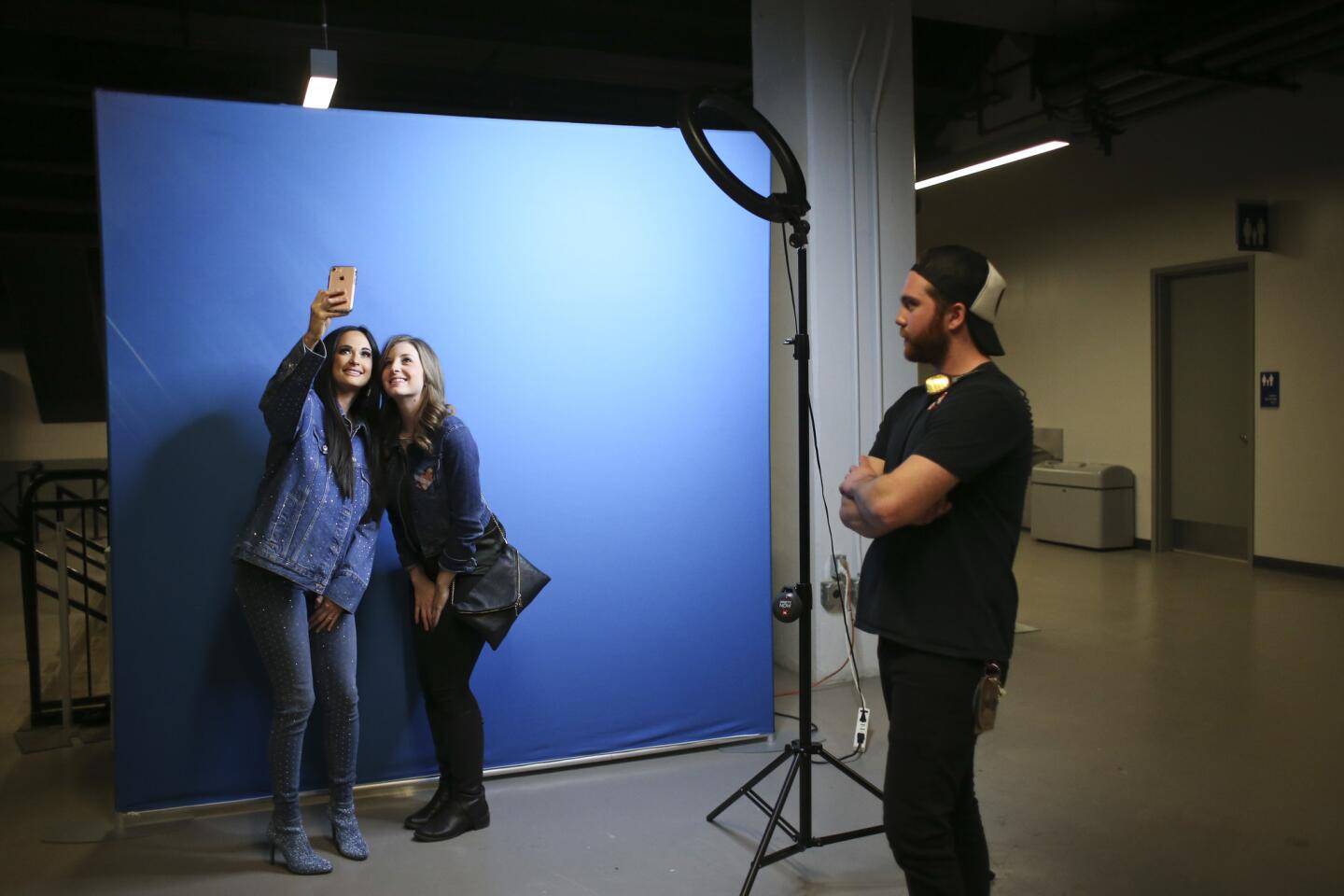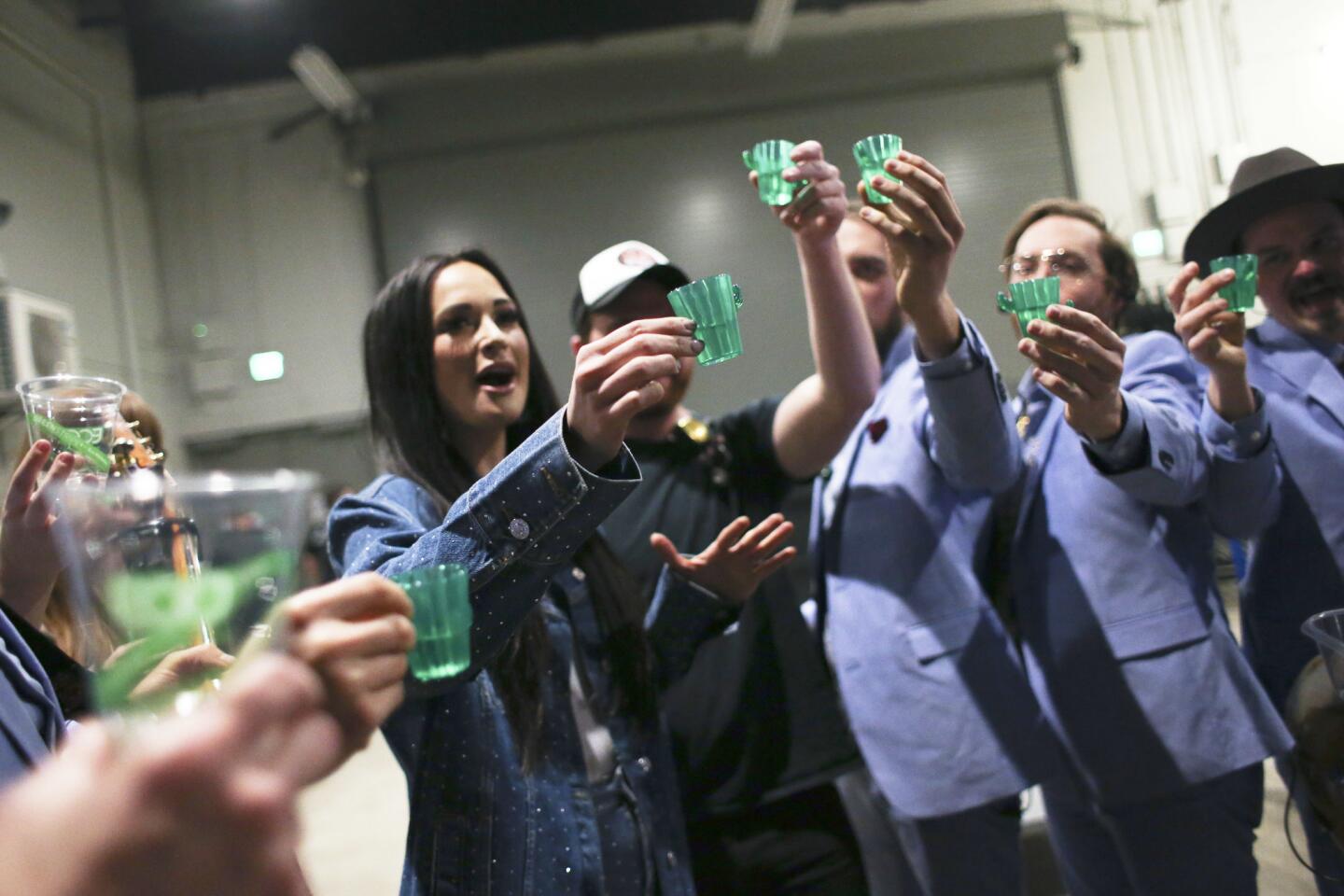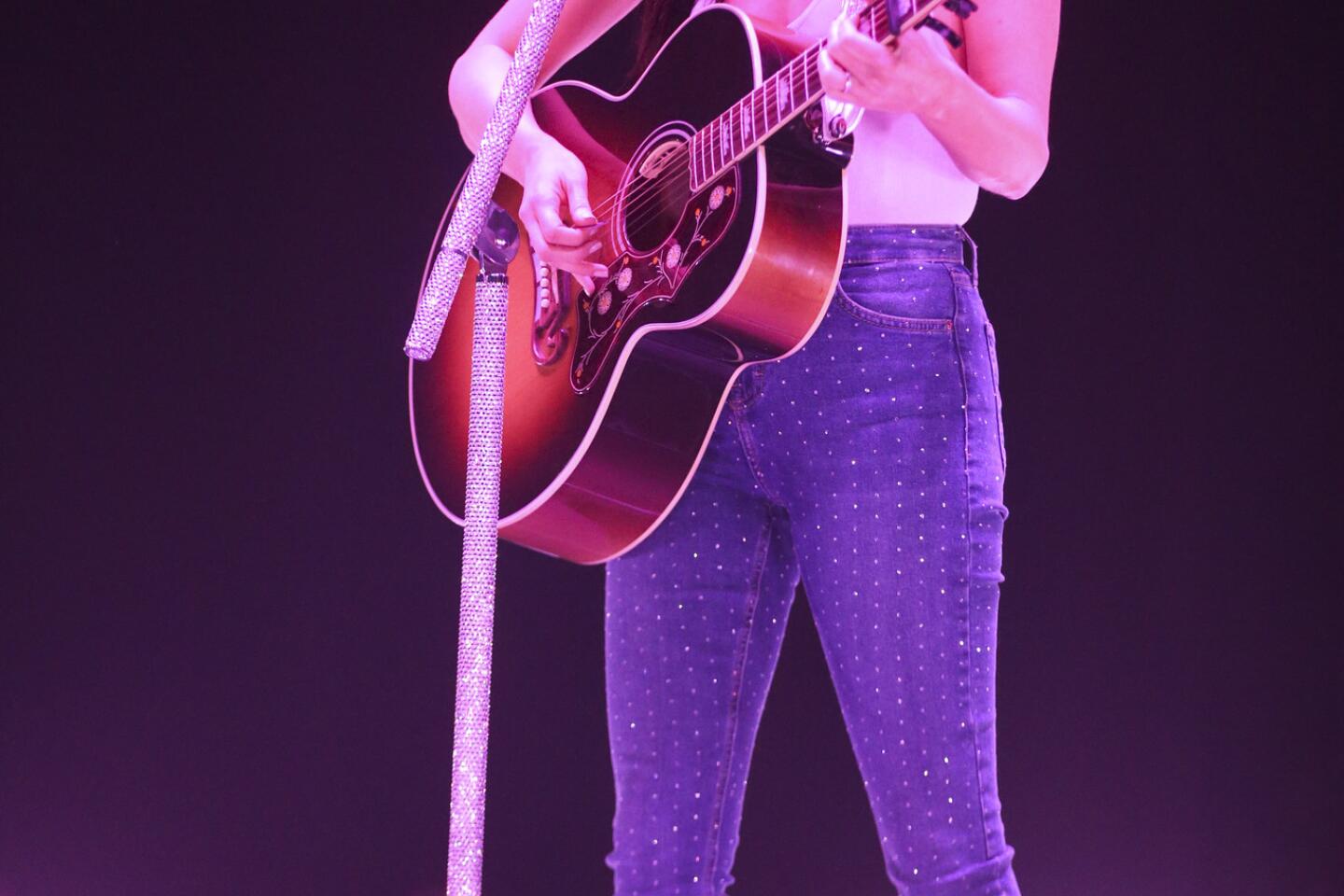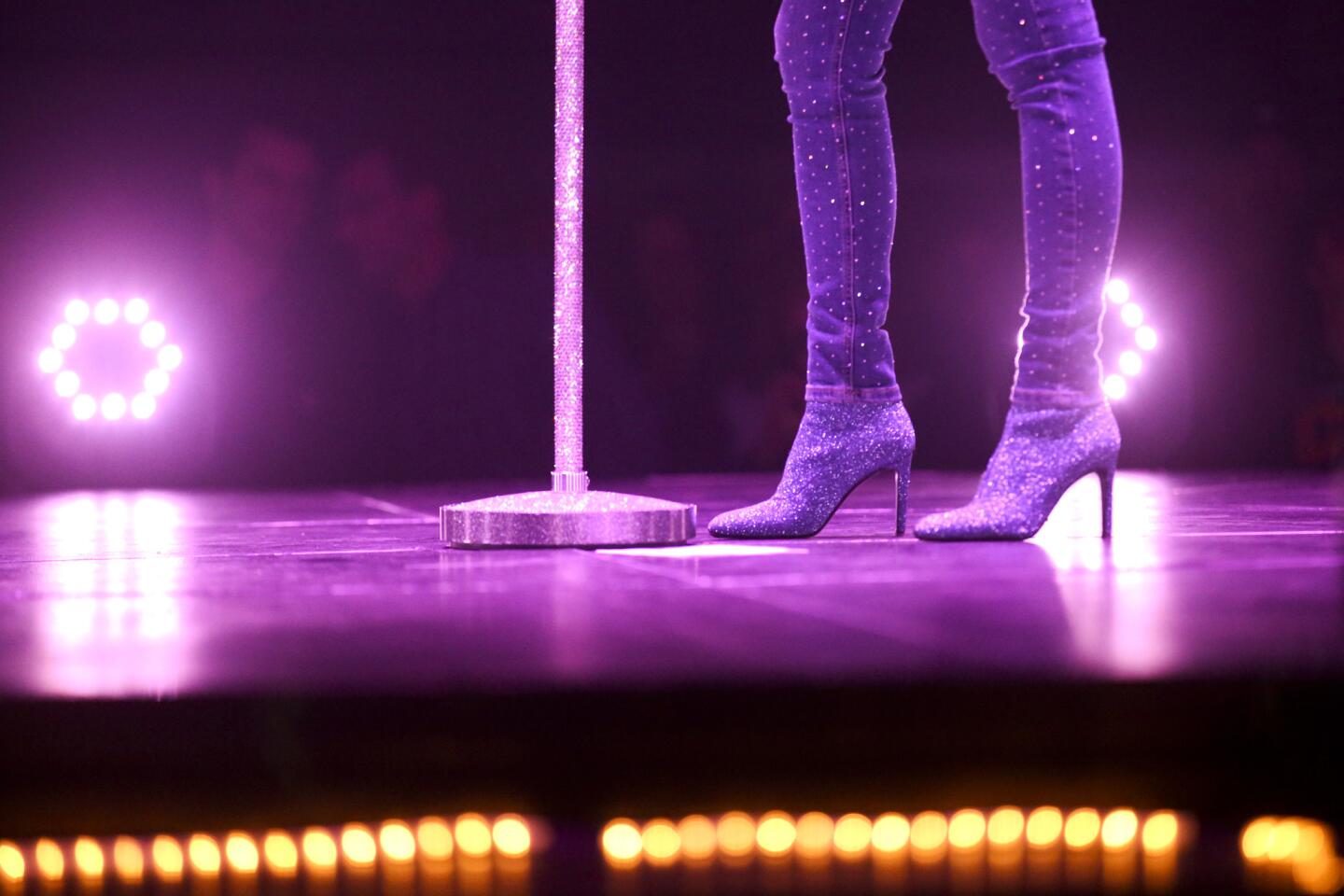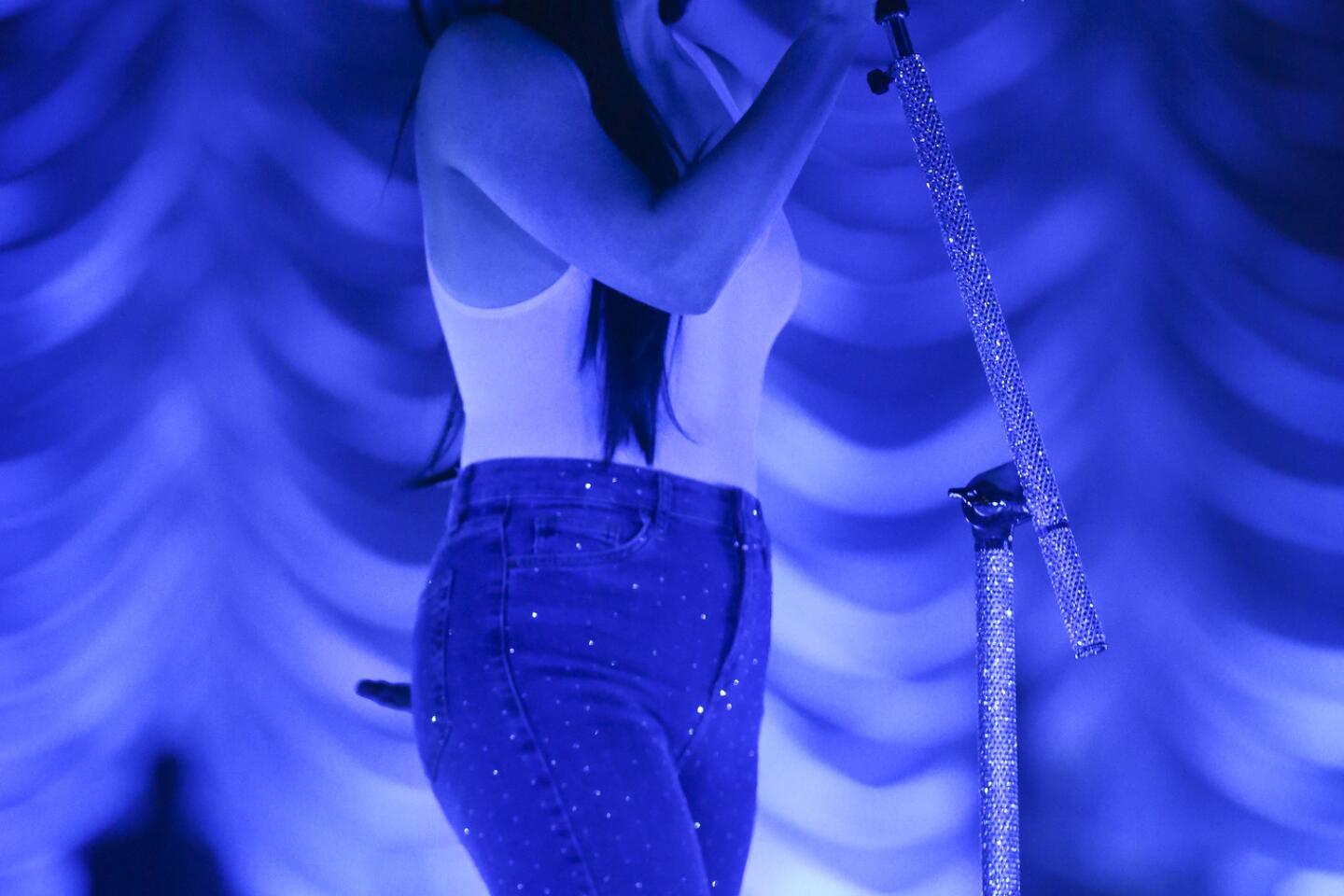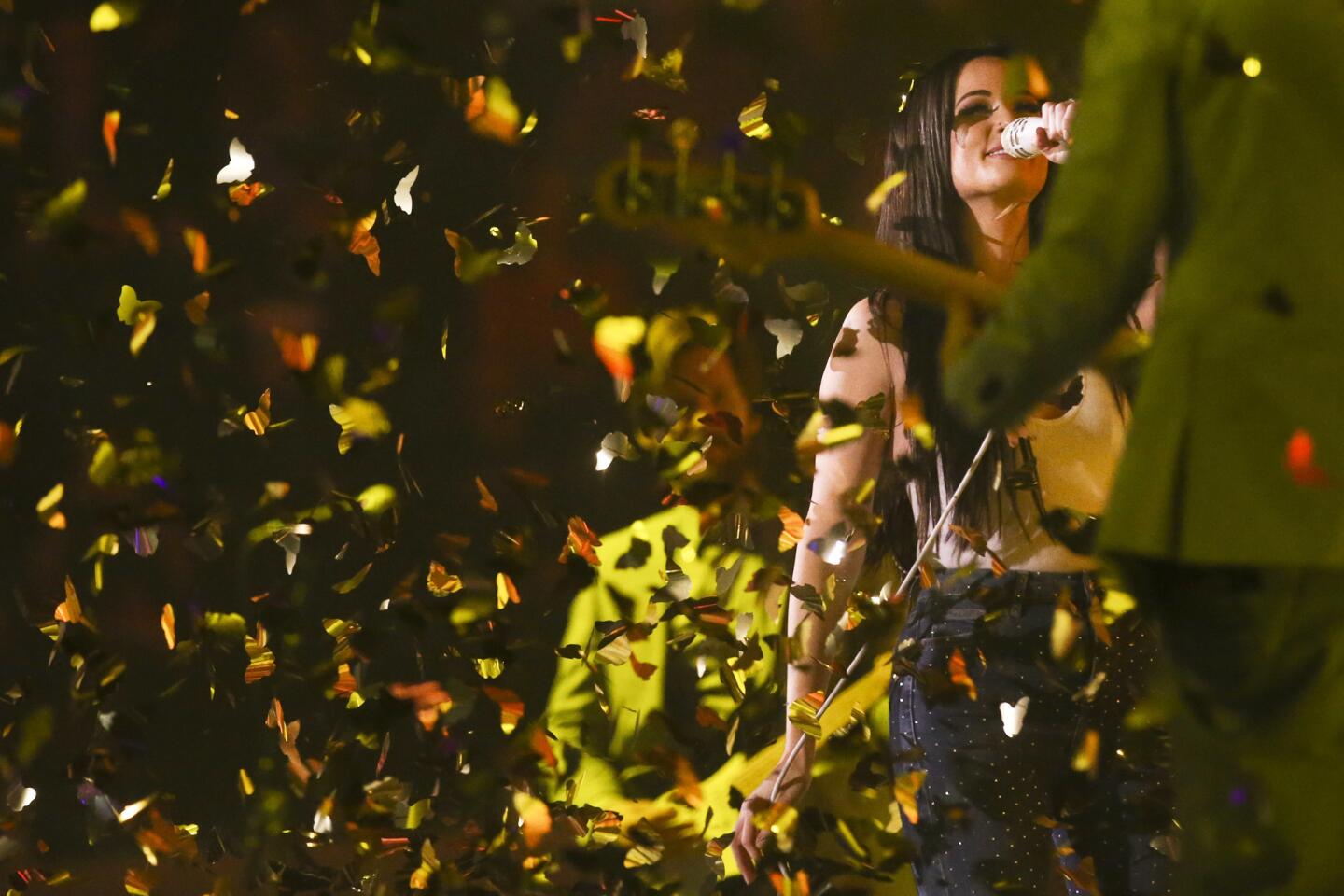Kacey Musgraves talks breaking the formula and entering ‘cosmic country’ with third album, ‘Golden Hour’
- Share via
Reporting from Cedar Rapids, Iowa — Like athletes who wear the same undershirt or refuse to shave while on a hot streak, musicians also often embrace certain rituals — some pragmatic, some superstitious — in their efforts to deliver a peak performance.
Maverick country singer-songwriter Kacey Musgraves is no exception.
While touring through the Midwest on a bill she’s sharing with headliner Little Big Town and rising country group Midland, Musgraves has been checking in on FaceTime two to three times a week with her personal trainer back in Nashville for morning workout sessions.
During a dinner break ahead of her set in Cedar Rapids, Iowa, last week, she loaded up on grilled squash and green beans to assuage any pangs of guilt over the modest portions of Dr. Pepper barbecued ribs and smoked Gouda mac and cheese she said “I just have to sample.”
Bypassing the banana cream pie that beckoned from the catered dessert offerings that also included peach cobbler and fudge brownies, she whimpered only briefly.
Just before taking the stage a few minutes later, after emerging from her self-administered makeup and hair-coiffing session aboard her tour bus parked behind the US Cellular Center arena, Musgraves gathered members of her band for another nightly ritual: a shot of tequila — a premium Herradura Anejo she brought back from a recent video shoot in Mexico City — slugged from green cactus-shaped shot glasses.
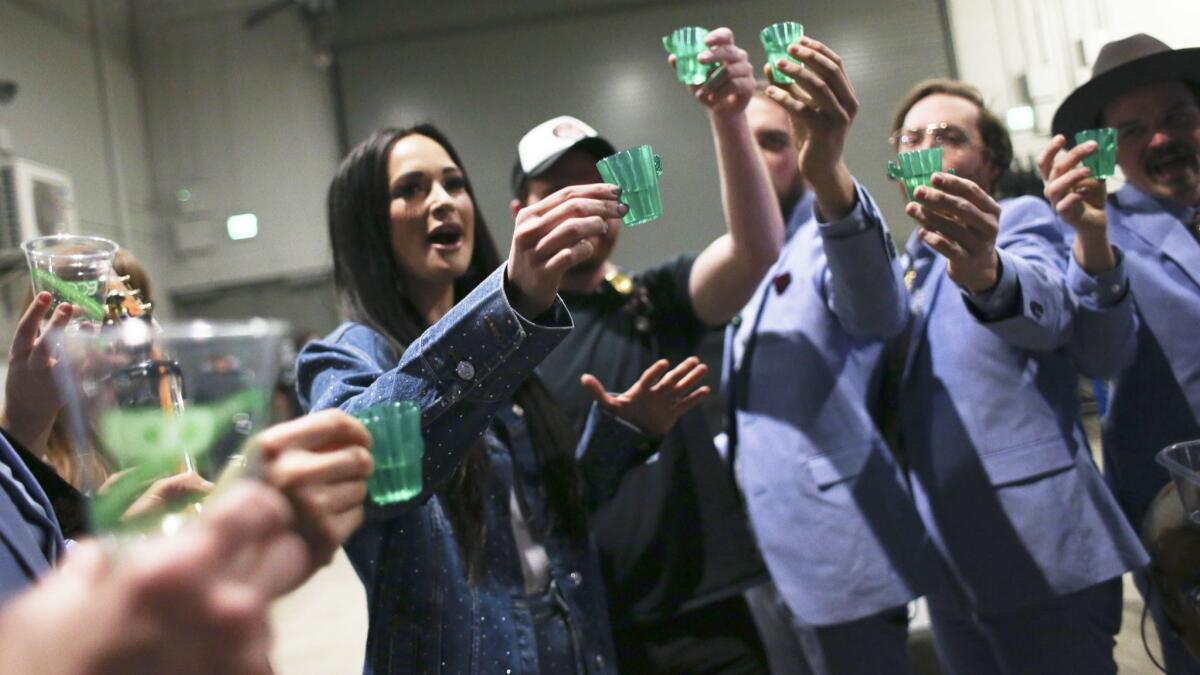
There’s one place, however, where she adamantly refuses to engage in anything approaching ritualistic inclinations: her songwriting.
“Music isn’t supposed to be a formula — it’s supposed to make you feel something,” said Musgraves, 29, the woman behind such country radio playlist brightening hits as “Follow Your Arrow,” “Merry Go ‘Round” and “Mind Your Own Biscuits” as well as the co-writer of Miranda Lambert’s career-boosting single “Mama’s Broken Heart.”
She quickly staked her claim in the progressive wing of country and Americana music by singing about enjoying a toke now and then (“Blowin’ Smoke”), about small-town hopes, dreams and struggles (“Merry Go ‘Round”) and about embracing diversity (“Follow Your Arrow”).
On “Golden Hour,” her third studio album (released Friday), Musgraves branches out further, into what she refers to as “cosmic country,” marrying elements of pulsing electronic dance music with traditional genre sounds and instruments while retaining the lyrical freshness that characterized her first two efforts.
Relaxing midafternoon in the comfortable surroundings of the customized tour bus she shares with several of her band members — a few hours before an intense snowstorm blanketed the region in white — Musgraves spoke in no uncertain terms about how she’s determined to follow her own arrow as a musician, whether her impulses immediately connect with fans and radio programmers or not.
“I never want to make the same record twice,” she said. For “Golden Hour,” that meant, in part, turning to new producers. Although Luke Laird and Shane McAnally, who Musgraves collaborated with on her first two albums, contribute to the current work, she primarily focused on working with Ian Fitchuk and Daniel Tashian.
“I like that they are very far removed from the typical Music Row, Nashville music mind-set,” she said. “I really liked that. There’s absolutely nothing wrong with Luke Laird and Shane McAnally. I love them dearly — they’re personal friends, and collaborators.”

“But I think we all collectively knew it was time to change it up and try out new paths,” she said.
“I feel like it can be easy go get into hindsight and think, ‘Well, people liked the last album, so let’s keep doing that.’ To me, that’s dangerous.”
Different directions
The yearning to mix things up is apparent in spades on “Golden Hour.”
In many ways, it diverges from and expands on the many attributes of her 2013 debut, “Same Trailer, Different Park,” which has logged total equivalent sales of more than 950,000 copies since it was released and earned her Grammy Awards for country album and country song (“Merry Go ‘Round).
Its 2015 successor, “Pageant Material,” has topped 300,000 equivalent sales, according to Nielsen Music, and collected her another country album Grammy nomination. Her songs and videos have been streamed more than 300 million times and have earned her a collective five wins and 33 nominations from the Academy of Country Music and Country Music Assn.
Where both of those collections wove genre-testing themes into traditional country musical traditions, “Golden Hour” finds Musgraves tapping other influences as source material, from her love of growing up in Golden, Texas, to her adoration of ’80s pop acts such as Madonna and ’70s figures including ABBA, the Bee Gees and Neil Young.
The new “High Horse” is built on driving synthesizer and rhythm loops like a vintage disco number, while the title track sounds closer to R&B artist Sade than Merle Haggard or Loretta Lynn.
There’s less of the in-your-face lyrical bite that has highlighted her music to date, and in its place more plain-spoken introspection — another conscious decision on her part in the pursuit of expanding her horizons as a songwriter.
“You can use different songwriting muscles when you are putting songs together,” she said. “I will never not love the witty turns of phrase that I’ve employed … but I just didn’t want to do that again this time around, because people have come to expect that from me.
“Although I love it so much, I was curious as to what other pictures I could paint, with not wrapping every single lyric up with a little bow,” she said. “Not everything has to be linear or explained to a T all the time. I think that can wear people out.”
With a little laugh, she added: “I wear myself out with it sometimes.”
All this could add up to a marketing nightmare coming from a more conventional musician, but Musgraves has been anything but conventional.
She demonstrated the spark of an original voice in songs she wrote for others before releasing “Same Trailer, Different Park,” reveling in the quirks of characters that she encountered growing up about 80 miles east of Dallas.
The way the head of her label sees it, Musgraves’ vision has transcended the microcosmic and has grown to encompass more of the larger world she’s experienced since becoming one of country music’s brightest new lights of recent years.
“She’s not someone you can put in a box,” said Cindy Mabe, president of Universal Music Group Nashville. “She’s the real thing, and she follows her own instincts. She lives and dies by her own vision — that’s the way Waylon Jennings and Willie Nelson were too.”
The fans agree
If it’s any indicator, the first three songs released from the album — “Butterflies,” “Space Cowboy” and “High Horse” — all received an enthusiastic thumbs-up and ear-to-ear smile from super fan Sydnee Comer, 12, who was first in line for the pre-show meet-and-greet Musgraves held in Iowa. She cited “Follow Your Arrow” as the song that first won her over with its spunky wordplay and easy-to-digest message of empowerment.
Sydnee’s mother, Alice, made a Christmas gift to her daughter of the one-on-one session in which Musgraves posed for selfies with her and other fans who scored backstage access through radio promotions and other avenues.
Musgraves’ following has been building steadily across age groups and borders. While in the U.K. for the Country to Country Festival organized by the Country Music Assn, she hosted about 20 “superfans” as designated by Spotify based on their streaming of her music, for high tea at the Spencer Estate, and carved out time for a private meeting with Elton John at his home in London.
Her stock also has risen quickly with organizers of the annual Stagecoach Country Music Festival in Indio.
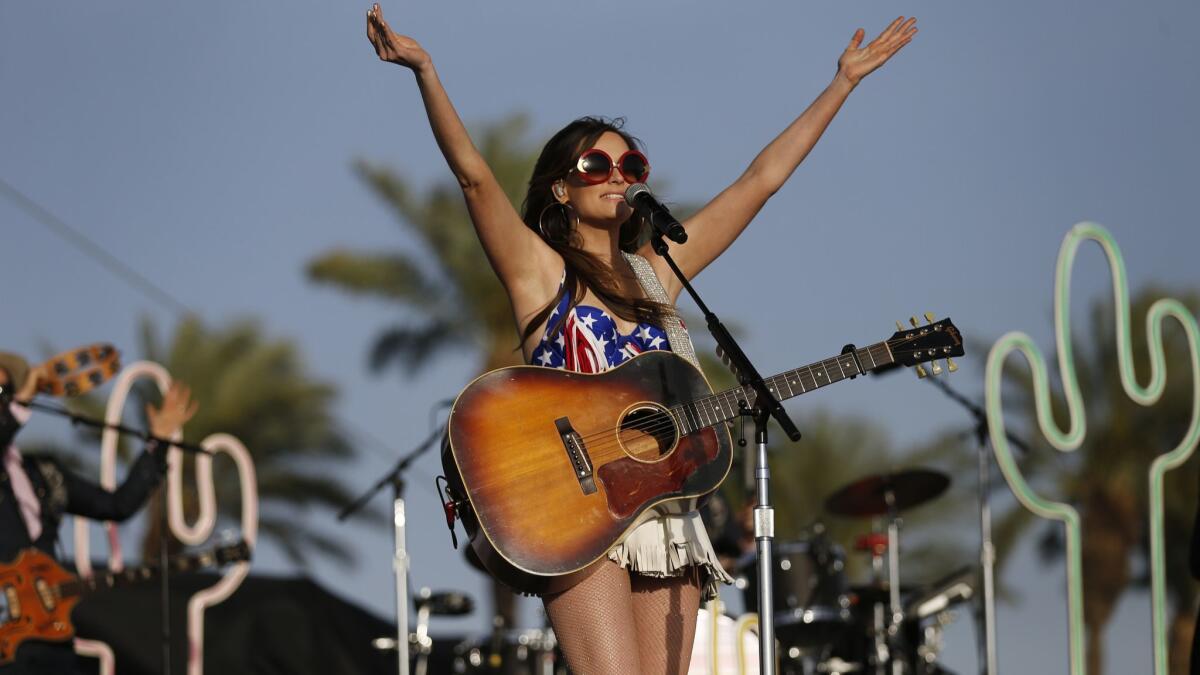
She’s returning to the world’s largest country music event on April 28, having worked her way up from promising newcomer low on the bill during her first appearance in 2015 to second-tier status this year, behind only Saturday headliner Keith Urban.
“I love everything she embraces,” Stacy Vee, director of festival talent for Goldenvoice, the promoter of Stagecoach as well as Coachella, told The Times in a separate interview. “I love her personality, her commitment, and I also love that she’s a hard worker.
“She’s not taking the traditional path; she’s totally carving her own path,” Vee said. “She has supported pop acts, while at the same she’s been one of the more traditional country artists.”
Vee strives to make Stagecoach one of the rare corners of the heavily male-centric world of country music where women are accorded more than token representation.
An advocate for gender and racial equality in many of her songs, Musgraves also is waiting for the day when that’s true across the music industry.
“Nobody’s telling Chris Stapleton he should be nicer and flirt more with [radio station] deejays,” she said.
After her run of shows with Little Big Town and Midland wrap, Musgraves will be going out later this year sharing a bill with former One Direction teen heartthrob Harry Styles that brings her back to the Southland for a July 13 stop at the Forum in Inglewood.
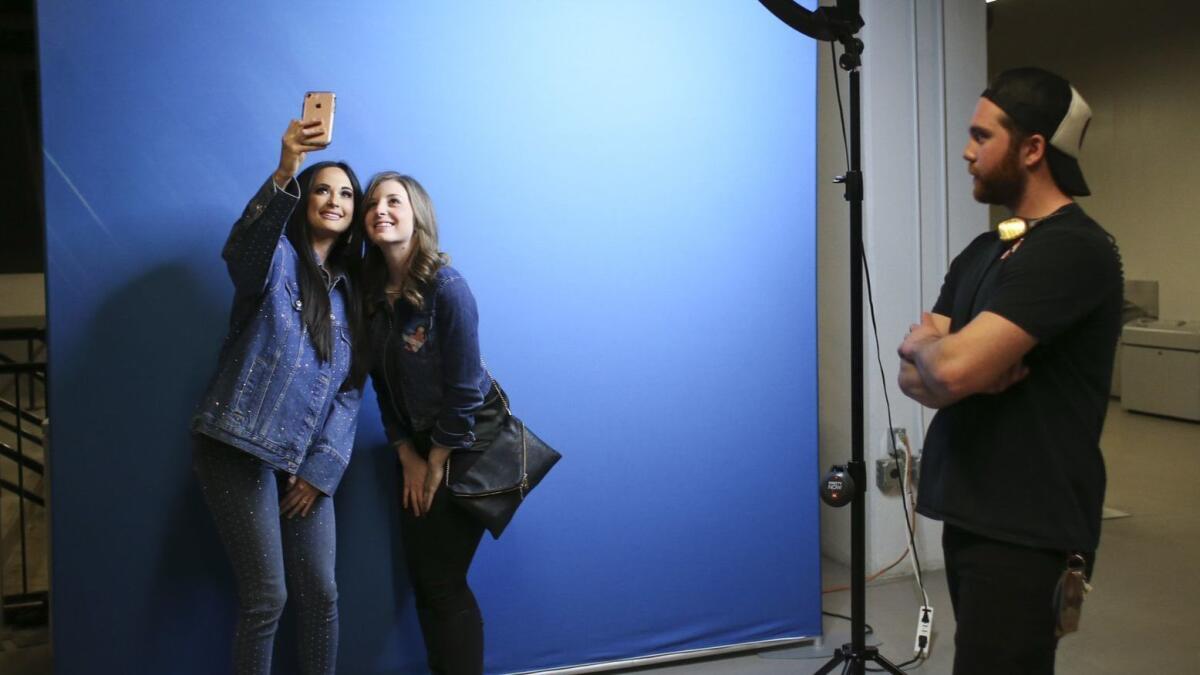
“I’ve always been the kind of artist who can bridge gaps and run over here and do a song with Miguel or Brian Wilson, or tour with Katy Perry or Willie Nelson. That’s always been my goal — just to do whatever feels right.”
Sitting on a bench seat in her bus a few minutes before the Cedar Rapids sound check, Musgraves spoke of both the changes in her life — her marriage in October to singer-songwriter Ruston Kelly at the top of that list — and her music. In particular, her collaborations with Fitchuk and Tashian on several new tracks that skew decidedly pop.
“The touring environment isn’t always conducive to your best creative self,” she said. “I had to say, ‘I just have to stop [touring to focus on writing].’ I want this third album to represent something different for me.
“It was strange,” she added, “because about same time that I got off the road and started getting back to creating is when I met my now-husband. My whole climate completely changed, and my songs started pouring out when I met him.”
The pop slant on several of the “Golden Hour” songs is akin in some ways to the broadening of the artistic palette Taylor Swift took with her 2012 album “Red,” when she began in earnest to move beyond the comfort zone of Nashville-approved country-pop.
“It is different — a lot has changed,” Musgraves said, dressed casual-to-go in a black-and-white print stretch tank top, black athletic leggings and running shoes, which she trades in a few hours later for her onstage outfit: a dazzling bejeweled sky blue denim jacket she scored in a thrift store with matching rhinestone-encrusted blue leggings and glittery mesh boots.
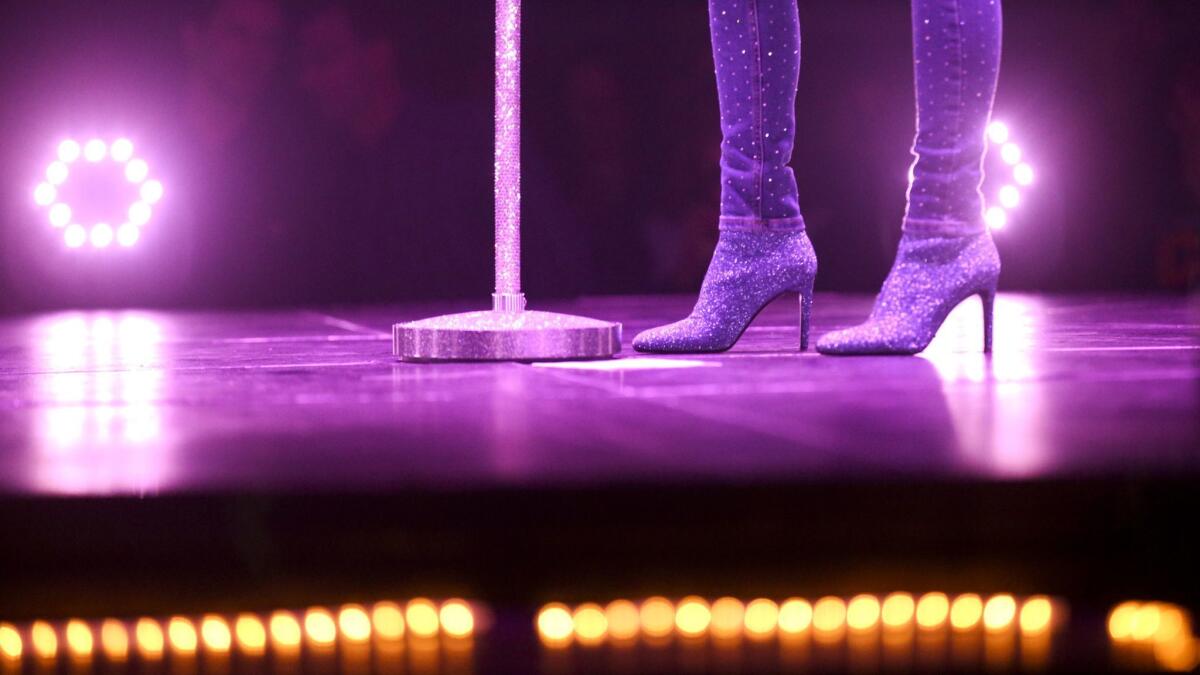
Part of her new path stems from her relationship with Kelly, which she said was sparked by her appreciation for his songwriting.
She said it’s brought her to a happier place, which comes out in several of the songs on “Golden Hour” — to the extent that some of the old acerbic wit kicks in when she broaches the subject.
“Another happy love song — bore, snooze!” she said with a laugh. “Butterflies,” by way of example, does channel the same joy she exudes six months into married life: “Untangled all the strings ’round my wings that were tied / I didn’t know him and I didn’t know me.”
Yet on the album, it follows “Lonely Weekend,” a meditation on missing a loved one. Another striking new track is “Mother,” a pithy rumination on her feelings about her mother — and Musgraves’ grandmother — that packs considerable emotional punch into the span of a mere 1 minute, 18 seconds, with spare solo piano accompaniment.
It’s a different style of writing than she’s been known for in consistently witty lyrics of songs such as “Merry Go ‘Round” and “Follow Your Arrow.”
The new “Rainbow,” which she wrote with two writers she’s previously collaborated with in McAnally and Natalie Hemby, is a song of reassurance and uplift. It’s directed at someone who doesn’t notice the sun reemerging after a storm subsides: “You hold tight to your umbrella / But darlin’, I’m just trying to tell ya / That there’s always been a rainbow hanging over your head.”
Explained Musgraves: “I’ve tried to leave a little more room for the listener to bring their own interpretations to songs rather than spelling everything out for them. I’m not going over every line with a microscope and analyzing them the way I have before.”
She summarizes it as relying more on feeling than thinking this time out.
And she’s perfectly comfortable favoring her artistic impulses over commercial considerations.
“You have to go into a project knowing it may not be everyone’s favorite,” she said. “And that’s OK. You’re going to get new fans, and some old fans may filter out, or they may come back on the next one. But as long as I feel fulfilled in whatever I’m making, that’s all that matters. I feel lucky that I get to create from my perspective. Then if anybody else likes it, it’s icing on the cake at that point.”

More to Read
The biggest entertainment stories
Get our big stories about Hollywood, film, television, music, arts, culture and more right in your inbox as soon as they publish.
You may occasionally receive promotional content from the Los Angeles Times.
